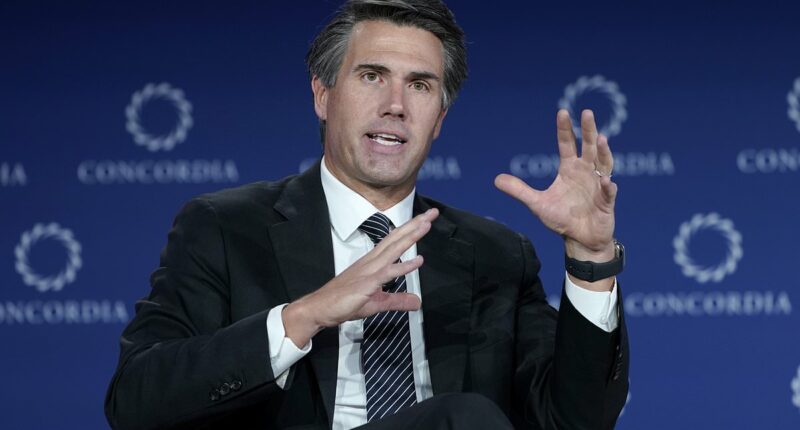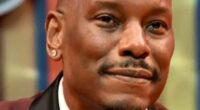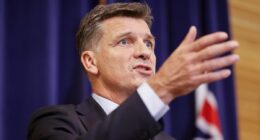Share this @internewscast.com
Leland Vittert is living the dream.
At 43, he has covered war zones for Fox News and is now a leading anchor at NewsNation, heading the coverage of the 2022 midterm elections.
But behind the glitzy lights lies a hidden challenge: Vittert has autism.
In a conversation with the Daily Mail, the Missouri-born anchor shared that he didn’t start speaking until he was three, faced challenges in making friends, and was relentlessly bullied during his school years.
While others seemed to naturally grasp human emotions, Vittert often missed social cues, frequently going on tangents or asking endless off-topic questions, which tended to alienate his peers.
His teachers suggested to his parents that he be tested and placed in special-needs classes. However, they declined, worried that an autism diagnosis would carry stigma and that those classes might not equip him for the real world like his current schooling could.
Instead, they set out to ‘reprogram’ their son themselves.
His father, Mark Vittert, spent countless hours teaching him the social skills that came effortlessly to other kids. This unique approach laid the groundwork for Vittert’s extraordinary career.

Pictured: Leland Vittert, 43, on NewsNation, where he is their Washington anchor
Vittert believes this instructive method could offer hope to other families with children on the autism spectrum. In his new book, “Born Lucky: A Dedicated Father, A Grateful Son, and My Journey With Autism,” he divulges his, and his family’s, experience with the condition.
In the book, Vittert explained how his father slowly taught him to navigate the world by working on social cue detection.
He also revealed that he had a difficult start to life. He was born via C-section after doctors found the umbilical cord – with two knots in it – wrapped around his neck. The issue could have caused potentially fatal oxygen deprivation to his brain in the womb.
Vittert was also born cross-eyed and had to have an operation at six months old to correct the issue. He has had two other operations since: one in fourth grade, between nine and 10 years old, and another in 2016, at the age of about 34, to tighten the muscles around his eyes. His right eye still drifts.
Initially, a young Vittert was diagnosed with ‘social blindness’ in the 1980s, when autism was barely understood. Also known as social-emotional agnosia, it refers to an impaired ability to understand and interpret social cues, facial expressions and body language
He wasn’t formally diagnosed with autism until reaching his 20s.
Although it took three years for Vittert to speak, once he started, he immediately launched into complete sentences. His parents don’t remember the first one, but Vittert said it was probably something along the lines of, ‘Can we go get ice cream?’
It was as his problems with peers mounted in childhood that his father started to teach him how to better acclimate into society.
‘The social and emotional connections that come naturally to people – not only did they not come naturally to me, but my instincts were all wrong,’ Vittert told the Daily Mail.
‘And my [father] had to figure out, for lack of a better term, how to adapt me, almost reprogram me, to understand human emotion and human interaction in the way that everybody else does.
‘I just didn’t, couldn’t understand others. And my father told me: ‘The way you see the world is not the way others see the world, and you have to adapt to them, they will not adapt to you.”
Vittert’s father gradually taught his son to keep eye contact and to focus on what others were saying or talking about, rather than what he wanted to say.

Vittert (right) was diagnosed with autism in his 20s. His father, Mark Vittert (left) painstakingly taught him the social cues that come to other children intuitively
Through practice, he learned not to interrupt others and to try reading what they wanted to talk about in a conversation rather than what he wanted to talk about.
Vittert said what became something of a checklist for him in every conversation has now turned into a habit – though, he would not call it second nature.
He told the Daily Mail he still struggles every day, battling to make sure he understands the context of interactions.
‘About three weeks ago, I was with my father-in-law playing golf,’ Vittert said. ‘We played 18 holes with this guy, a very nice man.
‘At the end, I had to pack my golf clubs into a travel bag because we needed to go, and we were late.
‘I was totally focused on getting my golf clubs packed in the bag, to the point that the older man who we played golf with came over and wanted to talk to me, and I couldn’t stop packing my bag.
‘I couldn’t get up. I couldn’t even look at him. I was just obsessed with packing the bag.
‘And afterwards, I thought to myself, ‘You know, that was about the rudest thing you have ever done in life’ – not ever… [but] it was just so phenomenally rude at 43 years old, I should have known better.’
Vittert said he sent the man a note apologizing. He told the golfer ‘how upsetting that had been, and I’m so sorry.’
But he intentionally left out the part about his autism.
‘I didn’t say, ‘Oh, by the way, it’s because of autism.’ My dad always taught me, you know, if you define yourself by your diagnosis, if you tell people… if you use it as an excuse, then you’re going to be defined by it.’

Pictured: Vittert as a child with his father. Teachers started to raise concerns when Vittert was just four years old, but his parents said they did not want their son to be labeled

Vittert (pictured above on NewsNation) now has a career many would dream of, and says he never uses his diagnosis as an excuse
Autism rates have exploded in the US, rising from one in 1,000 in the 1980s to one in 31 today, according to the CDC.
While experts say the rise is from a broadening of the term’s definition and better detection, others, including President Donald Trump and Health Secretary Robert F Kennedy Jr, have posited it is because of toxins, unhealthy diets and exposure to medications – such as acetaminophen – in the womb.
Regardless of the debates, Vittert is pleased with all the new attention autism is getting from Trump and his team.
‘I am not a doctor or a scientist, and I have the chemistry grades to prove it,’ he told the Daily Mail regarding Trump’s statement on acetaminophen.
‘That said, I think that finally, now we are having an honest and meaningful conversation about why autism rates have [surged] and are three times higher for boys. It is absolutely fantastic, right?
‘I think it’s very telling that there are so many people who are much more interested in attacking Trump and Robert F Kennedy Jr and using this issue to score political points than they are in finding answers. Like, how can you be against finding answers to the cause of autism?’
Vittert is a vocal advocate for autism awareness, and attends events in his hometown of St Louis, where he says people thank him for his work.
‘People need to know there’s hope,’ he said. ‘People need to know they’re not alone.
‘This book, it isn’t a prescription, it’s not a cure, it’s not a way to turn your autistic kid into a cable news anchor – it’s [an example of] what really dedicated and loving parents can do.’













